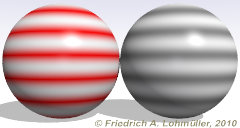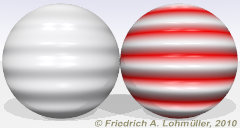Page d'Accueil
- POV-Ray Tutoriel
Conception de Surface
- Coleurs et Textures
Index
Syntaxe de texture
- Exemple de base
- pigment{ ... }
- normal{ ... }
> pigment_pattern
- Exemples normal
- finish{ ... }
Textures prêtes-à-l'emploi
- Règles de base
- colors.inc
- textures.inc
Couleurs en do-it-yourself
- color rgb< , , >
- Transparence
Motifs - Patterns
Listes de Motifs
Warps
uv_mapping
Mapping
Superpositions
Votre textures
|
|
|
Sur la syntaxe des composantes de »texture« :
'pigment_pattern' et 'normal'
|
Avec 'pigment_pattern' nous pouvons convertir chaque 'pigment' vers un motif en gris.
Ce motif en gris on peut utiliser pour un 'pigment' mais aussi apour un motif de 'normal'.
Il y a un effet particulièrement intéressant quand nous utilisons
le même motif non seulement pour le
'normal{ pigment_pattern{ ... }, INTENSITÉ}'
mais encore pour le 'pigment{...}' !
Se nous voulons un motif en gris d'une image, au lieu d'un pigment, nous devons utiliser
'image_map' ou 'material_map'.
|
Syntaxe pour pigment, normal et texture:
pigment{
pigment_pattern { PIGMENT_BODY }
color_map { COLOR_MAP_BODY } |
colour_map { COLOR_MAP_BODY } |
pigment_map { PIGMENT_MAP_BODY }
} //------------------------------ |
normal{
pigment_pattern { PIGMENT_BODY }
[Bump_Size]
normal_map { NORMAL_MAP_BODY }
} //------------------------------ |
texture{
pigment_pattern { PIGMENT_BODY }
texture_map { TEXTURE_MAP_BODY }
} //------------------------------ |
|
Exemple: Premièrement nous déclarons le 'pigment'
#declare Pigment_1 =
pigment{ gradient <0,1,0> sine_wave
color_map{
[ 0.0 color rgb<1,1,1> ]
[ 1.0 color rgb<1,0,0> ]
} // end color_map
scale 0.35
} // end pigment
//---------------------------------------
sphere{ <0,0,0>, 0.75
texture{
pigment{ Pigment_1 }
finish { phong 0.5 }
} // end of texture --
translate<-1,1,0>
} // end of sphere left ----------
sphere{ <0,0,0>, 0.75
texture{
pigment{ pigment_pattern{Pigment_1 }}
finish { phong 0.5 }
} // end of texture --
translate<-1,1,0>
} // end of sphere right --------- |
|
Sphères avec pigment (à gauche) et
avec 'pigment' de 'pigment_pattern' (à droite)
|
Example: 'pigment_pattern' pour 'normal'
sphere{ <0,0,0>, 0.75
texture{
pigment{ color rgb<1,1,1>}
normal {pigment_pattern{Pigment_1},0.5}
finish { phong 0.5 }
} // end of texture
translate<-1,1,0>
} // end of sphere left ----------
sphere{ <0,0,0>, 0.75
texture{
pigment{ Pigment_1 }
normal {pigment_pattern{Pigment_1},1.0}
finish { phong 0.5 }
} // end of texture --
translate<-1,1,0>
} // end of sphere right --------- |
|
À gauche: sphère blanche
avec 'normal' de 'pigment_pattern'.
À droite: Sphère avec 'pigment' et 'normal'
avec un 'pigment_pattern'
du même 'pigment'.
|
D'autres exemples pour 'pigment_pattern' ici :
pigment_pattern (1) e
pigment_pattern (2).
|
|


